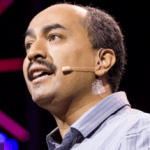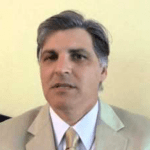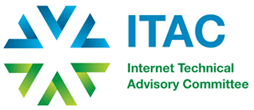The Internet Technical Advisory Committee (ITAC) to the OECD brings together the counsel and expertise of technically focused organizations, in a decentralized and networked approach to policy formulation for the Internet economy. The main purpose of ITAC is to contribute constructively to Internet-related policies developed in the OECD. It mostly contributes to the work of the OECD Committee on Digital Economy Policy (CDEP) and its specific working parties such as the Working Party on Communications and Infrastructure Services Policy (CISP) and the Working Party on Security and Privacy in the Digital Economy (SPDE).
Category: Newsletter
 By Constance Bommelaer, Senior Director Global Internet Policy, Internet Society -and Nicolas Seidler, Senior Policy Advisor – Internet Society
By Constance Bommelaer, Senior Director Global Internet Policy, Internet Society -and Nicolas Seidler, Senior Policy Advisor – Internet Society
The OECD Ministerial Meeting on the Digital Economy, held in Cancun on 21-23 June 2016, gathered more than 1300 participants from around 50 countries.
Ministers, along with high-level representatives from the Internet technical community, civil society, private sector and trade unions, all converged towards the need for an open and trusted Internet as a pillar of a growing and inclusive Digital Economy. These elements, along with acknowledgement of the value of multistakeholder cooperation in policymaking, are reflected in the formal outcome of this Ministerial, the “Cancun Declaration” on the Digital Economy.
By Walid Al-Saqaf, Internet Society Board of Trustee, postdoctoral researcher at Stockholm University
 Simply put, the blockchain can act as a virtual public ledger that records transactions processed and maintained by a network of communicating nodes running cryptocurrency software. It was invented in 2008 as part of Bitcoin by a person with the computer nickname ‘Satoshi Nakamoto’. It was envisioned as a peer-to-peer payment system and digital currency that can be transferred between any two users connected to the Internet, without using any intermediary.
Simply put, the blockchain can act as a virtual public ledger that records transactions processed and maintained by a network of communicating nodes running cryptocurrency software. It was invented in 2008 as part of Bitcoin by a person with the computer nickname ‘Satoshi Nakamoto’. It was envisioned as a peer-to-peer payment system and digital currency that can be transferred between any two users connected to the Internet, without using any intermediary.
While none of the panelists who replied to my intervention[1] ended up talking about the blockchain technology itself, they did acknowledge the need to embrace such new and innovative technologies so that they could be used for the betterment of societies. I thought that was a good sign.
By Robin Wilton, Technical Outreach Director for Identity and Privacy, Internet  Society
Society
During the OECD Ministerial in Cancun, I had the pleasure to moderate an ITAC panel discussion entitled “Collaborative Approach to Internet Security”.
In a very wide-ranging discussion, both the panel and the audience examined Internet security issues from a variety of perspectives. Early questions from the audience set the direction for the event and included:
- We can all envisage how things might look in 10 years’ time, but how can we get a clearer picture of the next steps that will lead us there?
- Security is often portrayed as consisting of Confidentiality, Integrity and Availability, yet we seem to spend 90% of our effort on confidentiality, 9% on availability, and the scant remainder on integrity. What can/should we do about that?
- How can we increase trust in the Internet, and both the perception and reality of trustworthiness?
IPv6: The Ball Is Rolling
By Marco Hogewoning, External Relations Officer (Technical Advisor), RIPE NCC 
It was in the 2008 OECD Ministerial meeting in Seoul that the OECD member countries took it upon themselves to: “Encourage the adoption of the new version of the Internet protocol (IPv6), in particular through its timely adoption by governments as well as large private sector users of IPv4 addresses, in view of the ongoing IPv4 depletion.”
A lot has happened since then, and in anticipation of the 2016 OECD Ministerial meeting, which took place June 21-23 in Cancun, ITAC organized a panel to focus on the progress made during the last eight years and discuss the remaining challenges in the global adoption of IPv6 in both the public and private sectors.
By Laurent Liscia, CEO of OASIS
The following is a statement by Laurent Liscia, CEO of OASIS and spokesperson for ITAC during the press conference following the OECD Ministerial Meeting’s Stakeholder Day.
“First, let me name a few highlights among the 9 principles the OECD Ministers agree on:
- Support the free flow of information
- Increase broadband connectivity and harness the potential of interconnected and converged infrastructures and digital services
- Embrace the opportunities arising from emerging technologies and applications
- Promote digital security risk management and the protection of privacy at the highest level of leadership
By Karen McCabe, Senior Director of Technology Policy and International Affairs at the IEEE Standards Association.
 A segment at the ITAC Forum held during the OECD Ministerial this past June was dedicated to a thought provoking discussion on Open Standards for an Open Internet of Things (IoT).
A segment at the ITAC Forum held during the OECD Ministerial this past June was dedicated to a thought provoking discussion on Open Standards for an Open Internet of Things (IoT).
Joining the interactive panel were Laurent Liscia, CEO and Executive Director at OASIS, David Conrad, Chief Technology Officer at ICANN, Monique Morrow, CTO, Evangelist for New Frontiers Development and Engineering at CISCO, Roberto Minerva, Research Coordinator at Telecom Italia Lab and Chair of the IEEE IoT Initiative, Elsa Chan, Co-Founder of Jetlun, and Luis Kun, Professor of National Security at the Center for Hemispheric Defense Studies at the National Defense University.
Working together
By Jari Arkko, Chair of the Internet Engineering Task Force *
 In my experience it is important that we talk to each other, all of us, the techies, the operators, the economists, and the policy people. We live in a connected world that is developing very rapidly, and none of us have a full picture of everything. It benefits us to share our views and increase our understanding.
In my experience it is important that we talk to each other, all of us, the techies, the operators, the economists, and the policy people. We live in a connected world that is developing very rapidly, and none of us have a full picture of everything. It benefits us to share our views and increase our understanding.
I want to start off with a personal perspective on three areas where mixing people with different backgrounds has been very useful.
The Internet Technical Advisory Committee (ITAC) to the OECD brings together the counsel and expertise of technically focused organizations, in a decentralized and networked approach to policy formulation for the Internet economy. The main purpose of ITAC is to contribute constructively to Internet-related policies developed in the OECD. It mostly contributes to the work of the OECD Committee on Digital Economy Policy (CDEP) and its specific working parties such as the Working Party on Communications and Infrastructure Services Policy (CISP) and the Working Party on Security and Privacy in the Digital Economy (WPSDE).
Table of Contents
Editorial: Towards an Internet for social and economic progress
By Constance Bommelaer Senior Director, Global Policy Partnerships, and Carl Gahnberg, Policy Advisor, The Internet Society
Guest article: OECD 2016 Ministerial: Meeting the policy challenges of tomorrow’s digital economy
By Josie Brocca, Policy Research and Advice, OECD
Building Blocks for Informing Data Public Policies to Enhance Privacy
By Karen McCabe, Senior Director Technology Policy and International Affairs, IEEE Standards Association
By Nigel Hickson, Vice President for Europe, ICANN
Identification: A Critical Enabler of Societally Beneficial Economic Growth
By Kenneth Dagg, Chair Identity Assurance Work Group, Kantara Initiative
Taking stock of privacy in APEC
By Christine Runnegar, Director of Public Policy, The Internet Society
Previous Newsletters
Newsletter N°1
Newsletter N°2
Newsletter N°3
Newsletter N°4
Newsletter N°5
About This Newsletter
ITAC provides an avenue for new technical insights to contribute to the work of the OECD. ITAC is open to any Internet technical and research organization that meets the membership criteria listed in the Committee’s Charter.
ITAC encourages Policymakers, members of Civil Society and Businesses to submit queries regarding any of our work to [email protected]
If your organization is interested in joining ITAC and contributing with technically informed advice to the OECD’s development of Internet-related policies, we invite you to visit our website: http://www.internetac.org, to read the “Criteria for Membership” in ITAC’s Charter (Section III).
For further information on ITAC, please contact us at [email protected]

 By Constance Bommelaer, Global Policy Partnerships, and Carl Gahnberg, Policy Advisor, The Internet Society
By Constance Bommelaer, Global Policy Partnerships, and Carl Gahnberg, Policy Advisor, The Internet Society
During the first week of December, the OECD’s Committee on Digital Economy Policy (CDEP) gathered in Paris to work on the preparations for the OECD Ministerial on the Digital Economy in Cancun, Mexico, to be held on 21-23 June 2016. In coordinating the input from the technical community, the Internet Technical Advisory Committee (ITAC) has been actively involved in the preparations of the Ministerial, which will have a strong focus on the economic and social benefits of an open Internet.
As we start 2016, we also conclude the end of the ten year review of the World Summit on the Information Society (WSIS), which has highlighted the Internet’s role as a platform for global empowerment for social and economic progress. From a technical perspective the Internet is indeed a network of networks, but as it has demonstrated in recent years, it is most importantly a network of opportunities
Since the last OECD Ministerial on the Future of the Internet Economy in 2008, the Internet and its uses have evolved tremendously. There are still the great challenges ahead, but as technology has come to permeate almost all aspects of people’s lives, the discussions have shifted from the technical to the social impacts of the emerging Information Society. For example, today the digital economy contributes 5 to 9 percent to total GDP in developed markets, and in developing markets it is growing at 15 to 25 percent per year, which means that increased access to the Internet, and the ability to use it, is more than bridging a digital divide – it’s an opportunity to bridge economic and social disparities. In light of these developments, the overall theme of the OECD 2016 Ministerial is particularly compelling: Digital Economy: Innovation, Growth and Social Prosperity
The OECD’s Ministerial is based on this important insight, and in particular how the open nature of the Internet is a key component of its success. As such, the discussions, and the work of the committee have been highly focused on how to harness the full potential of the Internet in the years to come.
There are also important challenges to address, that will be reflected in the four pillars of the Ministerial:
- Ensuring Internet Openness for continued innovation
- Building Globlal Connectivity
- Building a trust-worthy environment where the Internet economy can flourish
- Striving for jobs and skills in the Digital Economy
Many of the articles contained in this editorial offer an important contribution to these discussions. Also, on the day before the ministerial, the ITAC Forum will address a broad, but yet interrelated, set of issues, such as how to foster e-entrepreneurship, the importance of open standards for the Internet of Things (IoT), and the need for a collaborative approach to Internet security. All important components in realizing the Internet as a network of opportunities, where the free, reliable and trusted flow of data is at the core.
You are all welcome to join us at this occasion!
